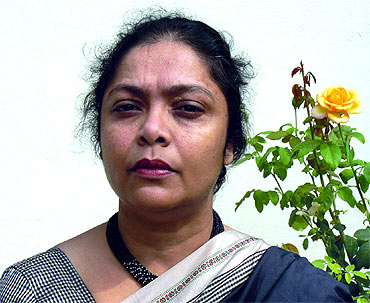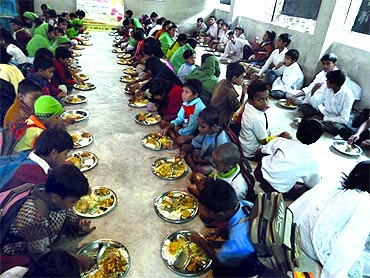Jaya Basu, the founder of Promise World Wide, a United States non-profit organisation that helps poor children in the suburbs of Kolkata, is ecstatic that a boy from her centre passed his high school exams with flying colours.
"One of my children scored 89 percent in high school. I was so happy for him," said Basu.
The boy, Basir Ahmed, has been with her since she opened Promise Charitable Trust, the India chapter of the organisation, a decade ago.
Basu came to the US in 2005 and joined the California Los Gatos Rotary Club, which helped her in achieving, she says, what "I always wanted to do."
Working for the poor was her childhood passion and during her stay in Kolkata, she had volunteered at one of the centers associated with Mother Teresa's charity organisation.
 |
"Since then I always wanted to do something. But money was the big problem," said Basu.
Basu, the only Indian in the Rotary Club in California, found many philanthropists in the US. "I want to tell you they are so nice. They had no clue about the work I was doing, but they trusted me and gave me money. Now a few people from Rotary have joined the Promise World Wide advisory board. I started it with my pocket money in 2000 and it got an official status of 501c (3) (tax-exempt nonprofit corporation) in 2001."
Basu's centre, which is located in Nawabpur, a village near Kolkata, runs in two shifts. It provides free lunch to children living in extremely poor rural areas and also offers free tutorial service.
"I started with only eight children and today there are 200 children," said Basu.
She said every day, the centre offers full meals and there are eight teachers. "These children get no help from their homes. They come at 7 in the morning and the teachers help them with their homework and curricular activities. At 9.45 am, they eat lunch and go to the neighborhood government-run school," she said.
"Ours is not a school, it is a tutorial class where children come and stay for three hours," said Basu. She added that she is trying her best to get a building for a school.
Reportage: Ritu Jha
For Kolkata's poor children, the promise of a better future
Image: Students at Basu's school share a mealBasu said she did not have enough money to start the school so she rented a small center of 1,500 square feet. "You cannot buy comfort if you do not have money. Metropolitan cities are not representative of India. To know the real India people have to go inside villages and suburbs," she said.
"I always wanted to start (a project to help the poor) and it is better to start from a place you know. So, since I am from Kolkata, I started from there," said Basu, who gives credit to America and her club. "What I like most about the American people is that if they say no, that means no. But if they say yes, they are totally committed. It is so wonderful to work with them."
Basu said her ultimate goal is to build a school, because the neighborhood schools do not provide quality education. Most of the time teachers do not show up, children are not getting standard education, "so I think that if I am trying to give a better life, I have to give them proper education," said Basu.
"I really do not have money, but my dream is to increase one class every year. Recently somebody donated land and now I am looking for the corporate sector to donate money," said Basu.
She said Basir, who scored 89 percent, will teach students at her center and she will bear the cost of his engineering exams. "Now he can work at the school and give money to his family. He used to work as a paper boy," said Basu.
 |
Promise World Wide is also trying to provide scholarships to meritorious students, so that they don't have to work to earn a livelihood.
Basu also has a separate program for mothers, who come in the afternoon when their children are at school, and hand-knit organic dishcloth that is exported to the US. It is available at ACE Hardware and Whole Foods and Amazon.
"These women are very happy. I helped open bank accounts. If you make the woman of a family economically independent, you can break the cycle of poverty," said Basu. "The US is my country too and I have got a lot from this country and India is my birth place. If I hadn't been here (the US), I could not have thought of starting anything," Basu added. "This country gives me that courage and the dream to give kids like Bashir some kind of lifestyle."



article